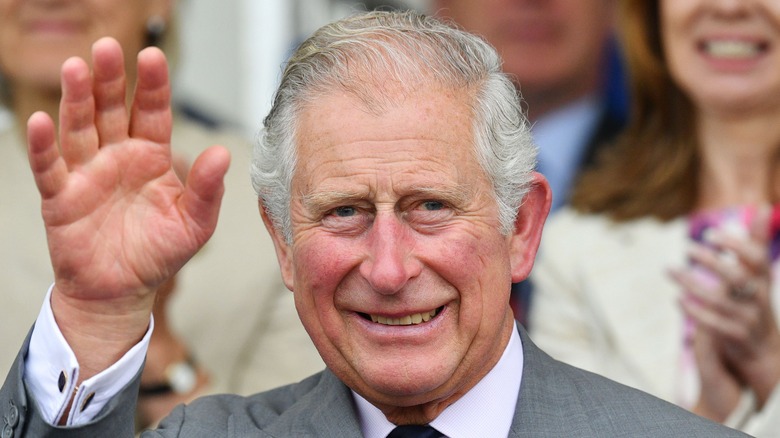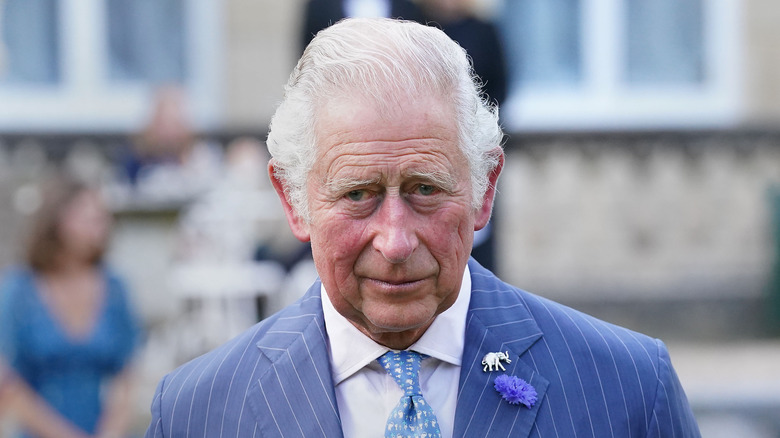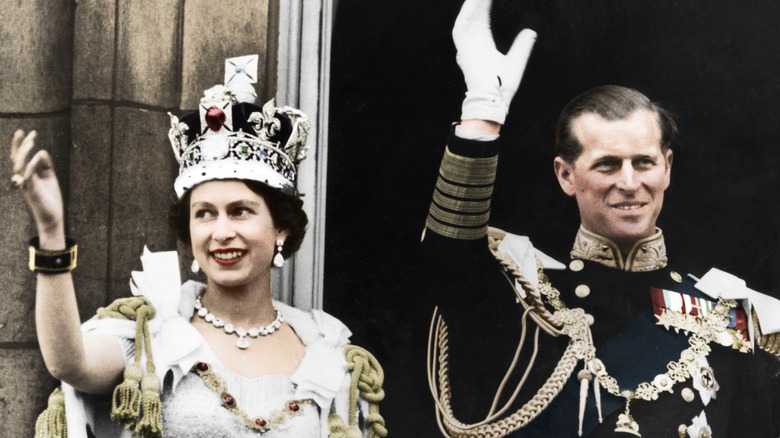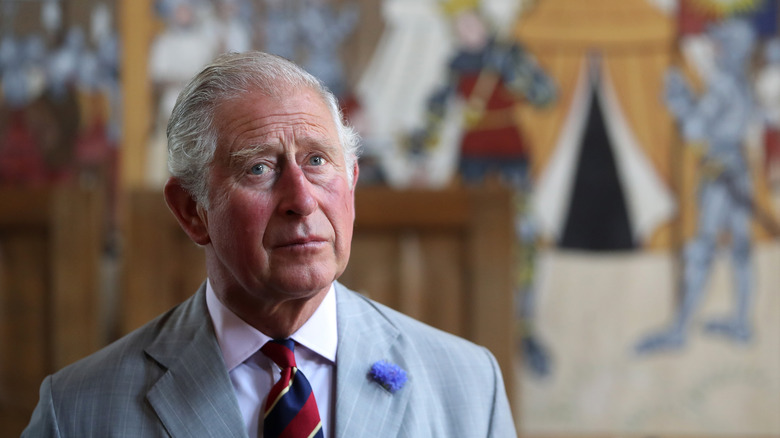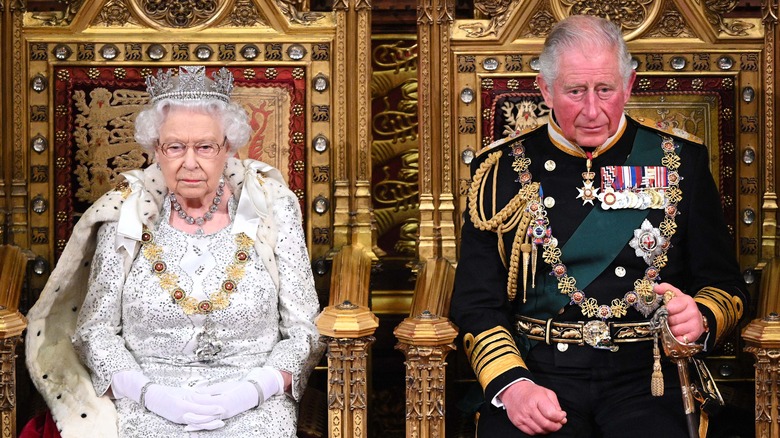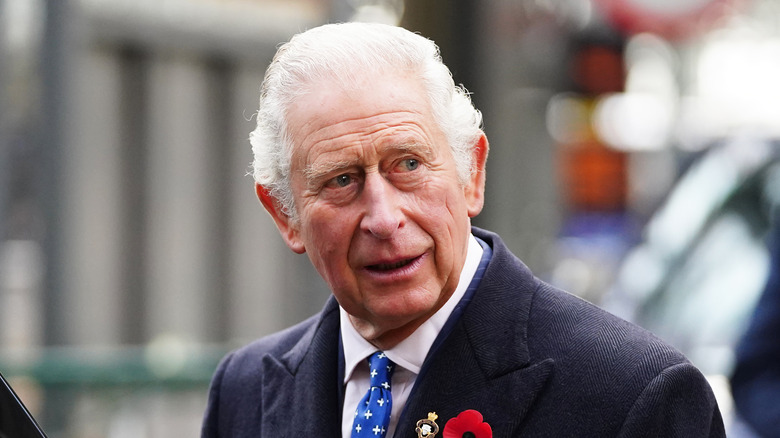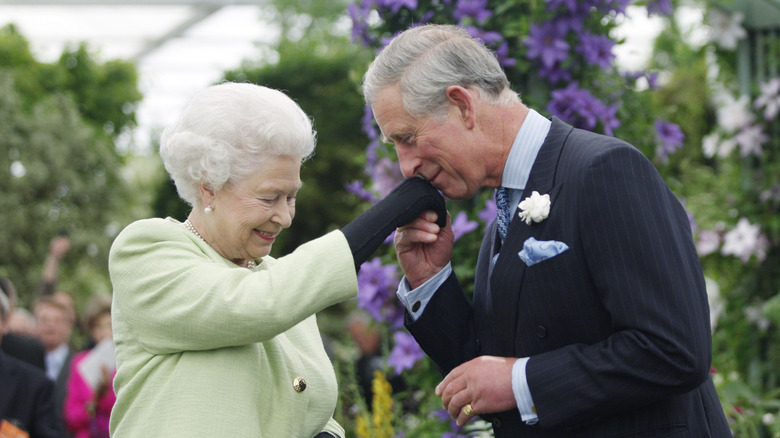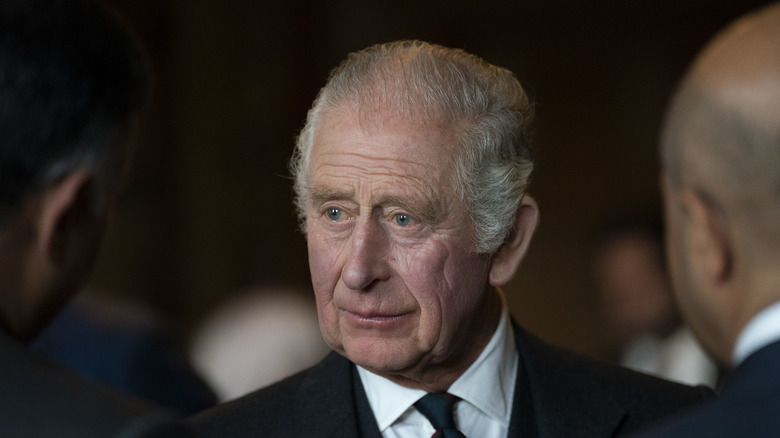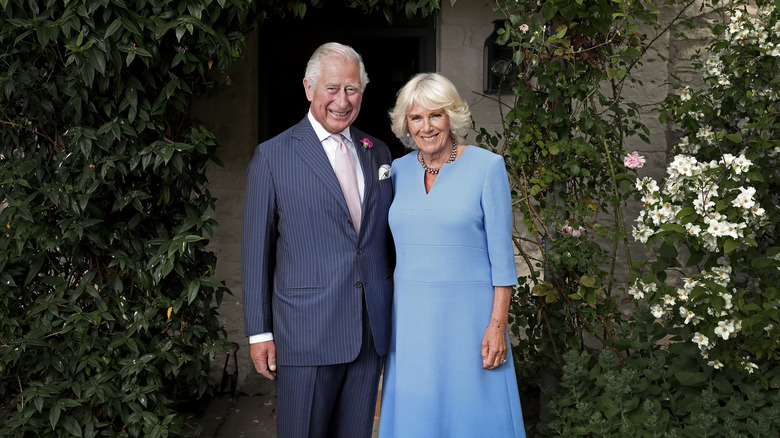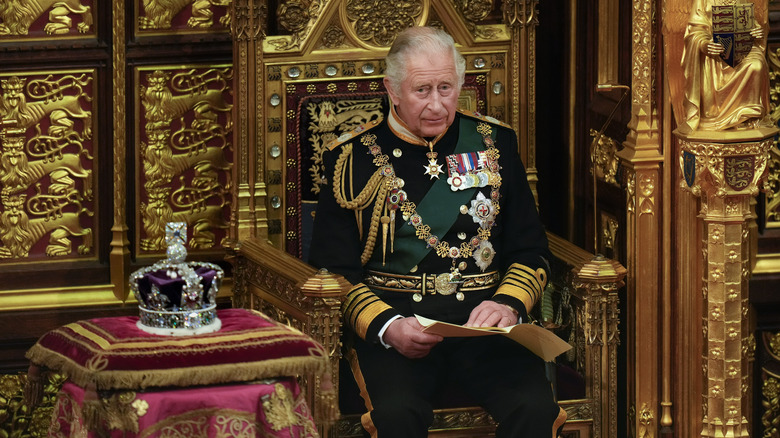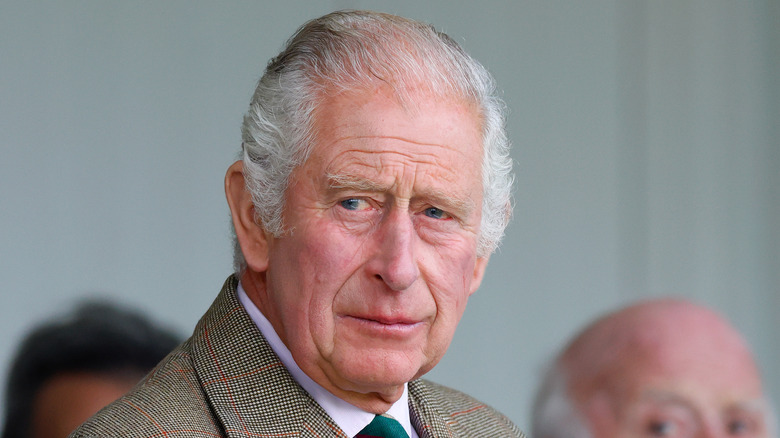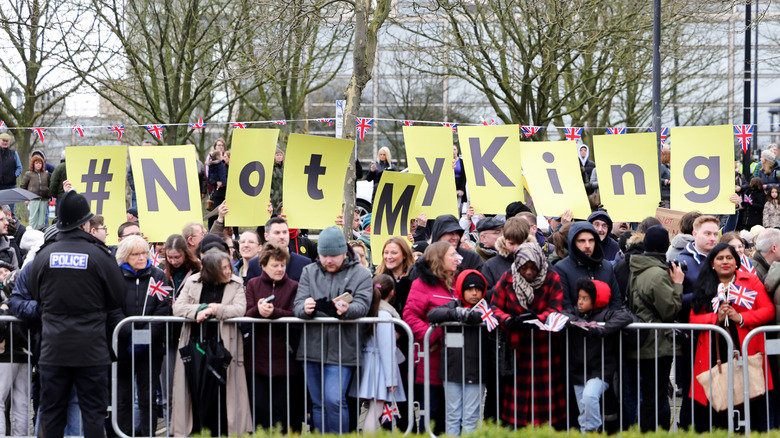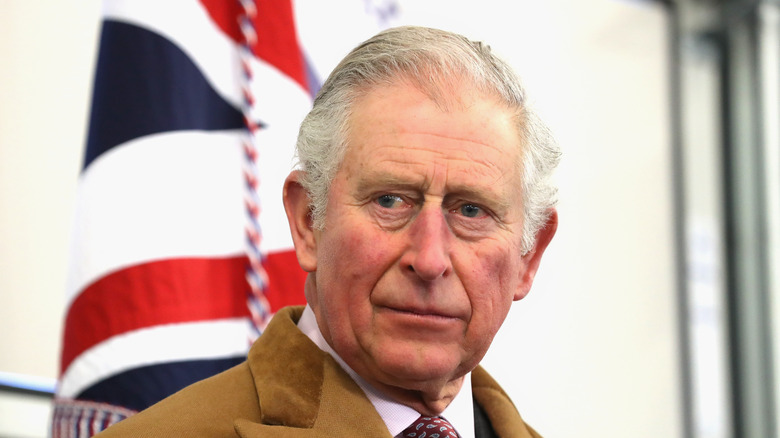Here's How Much King Charles' Coronation Will Cost
When Queen Elizabeth II died at the age of 96 in September 2022, her death marked several expected yet truly unbelievable changes. Her son immediately became King Charles III upon her passing, fulfilling the role that he has prepared for his entire life. Titles were handed down to members of the royal family, everyone moved up one spot in the line of succession, and the future of the monarchy started to shift in the aftermath of the queen's death. As she was of advanced age, many of us have only ever known her to be the reigning monarch. To say that Elizabeth's death marked the end of an era is a significant understatement.
Even though he became king immediately following his mother's death, Charles has yet to formally be crowned. His coronation is set to take place on Saturday, May 6, 2023, and already has garnered quite a lot of attention due to both its historic status and its cost. When Elizabeth was crowned all those decades ago, her coronation marked the turn of a new royal era. Charles' is likely to do the same, but it hasn't been a hugely welcomed event by the public, no doubt thanks to the tab. Though unconfirmed as of publication, the coronation is set to cost about £100 million, which is roughly $125 million. It's an eye-watering bill that is turning heads, especially considering that an opulent coronation wasn't always the plan.
King Charles seemed aware of unnecessary costs
Even before he became the reigning monarch, King Charles III was exploring the idea of a slimmed-down monarchy — i.e., tightening the strings of the royal purse, focusing on the senior members of the royal family, and condensing the financial responsibilities of the taxpayer to push the firm into the 21st century with far more vigor. When Queen Elizabeth II died and conversations about his coronation ramped up, Charles seemingly understood that his perspective on a leaner monarchy should apply to the coronation as well. Instead of all the pomp and circumstance, it was reported that Charles would opt for a much smaller, more modern event.
Shortly after Elizabeth's passing, sources told The Telegraph that the forthcoming coronation would reflect Charles' vision of a modern monarchy. Not only were the original plans for the coronation set to be less expensive with a smaller ceremony in general but the king is also said to be aware of the diversity of present-day England and wants to bring elements to the coronation to reflect modern times. By bringing members of community groups and varying religious practices to the table, it seems as though Charles is not only aware of bringing the costs of the coronation down but also presenting a thoroughly modern approach to the day.
Charles' coronation will be a much smaller affair than Queen Elizabeth's
As soon as Queen Elizabeth II died, parallels were drawn between her time as monarch and the impending role that King Charles III would undertake. Of course, questions about the coronation cropped up immediately, and comparisons were made to the queen's ceremony. Elizabeth's coronation, which took place on June 2, 1953, was said to cost about £43 million, roughly $54 million in today's money. The event spanned more than three hours and was televised, allowing the members of the public to revel in their new queen's day. To say that they pulled out all the stops is an understatement. It was reported shortly after her passing that Charles would not embrace a similar approach but trim the coronation wherever possible.
"I don't think people would stomach such a vast ceremony," Ian Lloyd, the author of "The Duke: 100 Chapters in the Life of Prince Philip," told Express about Charles' impending coronation. "I don't think people would like that sort of expense. [Charles's coronation] will probably be more like it happens in Europe, they do a swear-in ceremony. If you look back to the Queen's coronation, it took one year to plan it. They transformed Westminster Abbey, they built an annexe to create more seatings. I don't think people today would like those kinds of things."
The 'cost of living coronation'
Amid reports that King Charles III would be slashing costs associated with the coronation, a new term cropped up — the "cost of living coronation." Sounds good, right? Like the United States and the rest of the world at large, Great Britain has been battling increased costs, inflations, stressed trade, and more economic hardships amid the ongoing war in Ukraine, the lasting impacts of the COVID-19 pandemic, and a myriad of other issues. As such, Charles' term to describe his coronation seemed to hit a good spot with taxpayers, seemingly reflecting his goal of making the royal family less financially reliant on the British public.
Explaining the term and Charles' then-approach to the coronation (and particularly its cost), a source told The Telegraph, "It will be shorter, sooner, smaller, less expensive and more representative of different community groups and faiths. It will be a slimmed-down monarchy on display throughout. I wouldn't be surprised to see just Charles and Camilla, Kate and William and their children on the Buckingham Palace balcony afterwards."
Specifically, the source pointed out the likely trimming down of military presence, as Queen Elizabeth II's coronation featured 40,000 troops and all the pomp and circumstance that came with so many service members in one place — likely an aspect that Charles was said to be considering cutting back.
Coronations are paid for with tax dollars
Amid the planning of King Charles III's coronation, much attention has been paid to the cost. You might be wondering why. As it happens, the royal family picks up the tab for the opulent weddings we have witnessed, but as the government is involved in the coronation, the event is paid for by the taxpayers. As such, the coronation has been under heightened scrutiny given that it relies on tax dollars amid a housing crisis, economic strain, and more international conflict.
When Queen Elizabeth II was crowned in 1953, Great Britain was still trying to catch up on all the costs incurred during World War II. Prime Minister Winston Churchill approved £1.5 million for the day (about £50 million in today's currency). The young monarch was incredibly supported both at the time and throughout her reign, making the large bill a bit more appetizing to the public. After all, Europe was in a period of recovery, and the queen represented a new future for the monarchy. It was quite the spectacle to behold.
Charles is a bit different. His approval rating has been consistently low for decades, the economic environment isn't particularly great, and the taxpayers will witness him and Camilla, Queen Consort, pulled in a four-town gold chariot — not exactly the best optics.
Slimmed down plans discarded for an opulent coronation
So with all this talk about a slimmed-down coronation, why is the event costing so much money? King Charles III's plans for a condensed ceremony were thrown out, and he instead decided to go all in for the big day — despite the economic hardships and the fact that the coronation will be funded with tax dollars. It was a 180-degree turn from the new king, who promised to alleviate the "great anxiety and hardship" plaguing the country. Despite that and many reports that the coronation would be a much less expensive to-do, that plan was trashed, and instead, the king will be honored in all the glory that, whether you love the royals or hate them, is expected of the firm.
You may be asking why the original plans were scrapped. Ego certainly had nothing to do with it (can you hear the sarcasm?), but rather the decision was chalked up to a PR opportunity, allowing Great Britain to present itself as a unified and celebratory country while also showing off the royals and all the pomp and circumstance that comes with them.
So how does the current government feel about the increased costs? Despite the abandoned plans, Prime Minister Rishi Sunak said the coronation would be "a unique moment for the country."
Contemporary issues have raised expenses
So why is Charles' event going to cost so much more money? A royal source explained a portion of the expense to The Sun, noting that 21st-century circumstances and international strife at large are partially to blame.
"In today's money, the 1953 Coronation cost around £50 million, but estimates for King Charles's are twice that because of things like security, which weren't such a big issue back then," the source says. And while politicians like First Minister of Scotland Nicola Sturgeon admit that, if handled responsibly, the coronation will be worth the cost. However, other critics aren't convinced.
Graham Smith, the chief executive of Republic, a political organization in the United Kingdom, has called the coronation "completely unnecessary constitutionally nor legally required." His vocal calls against the event have escalated beyond that, and many taxpayers are said to be questioning the importance of the event, given how much it's going to cost.
Threats justify the extra security
Queen Elizabeth II's coronation came shortly after the end of World War II, leading one to assume that security was a big deal. So why does King Charles III's coronation require such heightened security? Why is more than twice the amount of money being spent on safety? As it turns out, serious threats have reportedly been made, prompting security protocols and officers on the ground during the coronation to be on high alert. Simon Morgan, who was a royal protection officer for the Metropolitan Police, told Express that given the high-profile nature of the coronation and the presence of not just Charles but international figures, politicians, and celebrities, the event could be a hot target.
"You have to consider everything from international terrorism all the way down to the single cause issue and everything that goes in between those two scales," Morgan explains, noting past terrorist threats and attacks throughout Great Britain as well as other issues such as the war in Ukraine, ISIS, dissidents from the Irish Republic and more. British agency MI5 has noted that an attack on the day of the coronation is likely, adding even more importance to the presence of security.
Economic boosts may cover the taxpayers' tab
With all the conversations about abandoned plans and the cost of King Charles III's coronation, you may be asking how Great Britain plans to get that money (all $125 million) back. When you take a step back and look at the coronation, it is an event of the decade and a huge source of tourism and opportunity for local businesses. As a source tells The Sun, not only will the television rights to the coronation cover a huge portion of the bill, but the booking of hotels, the purchasing of memorabilia, and the money that will be funneled back into the economy from travelers will help soften the blow. The source further argues that the coronation will help strengthen the economy. Their estimations are bolstered by a local consulting firm, which figures that the event could see an additional £1 billion boost.
Still, Cabinet Office minister Oliver Dowden says that Charles is "mindful of ensuring that there is value for the taxpayer." "It has always been the case that the government have paid for coronations," he adds. "It is right that we celebrate this moment in the life of our nation and do so in an appropriate fashion and in a way that the nation can come together in celebrating."
Charles is mindful of the opulent optics of the day
The ceremony is just about as opulent as a day can get. King Charles III's robes alone demand careful planning. The crown that Camilla, the queen consort, is set to wear has received a ton of backlash. Why is all this effort being made when Prince William will likely be crowned in a decade's time? There are many questions surrounding the coronation, and Charles is said to be mindful of just how out of touch the event may appear.
Cabinet Office Minister Oliver Dowden further commented on this particular aspect of the coronation, saying that of all the national moments that can be shared, the coronation is one of which that, despite the tab, will bring people together. "These are moments in the life of our nation. They bring joy to millions of people. They also mark us out as a nation around the world," he said.
The slashed guest list may cut back costs
You might think that the coronation's $125 million price tag would allow for a huge guest list. Think again. When Queen Elizabeth II was crowned, more than 8,000 people were invited. Westminster Abbey was decked out to ensure that all guests could take in the day. Though it will cost more than double that of his mother's, thanks to security and other safety measures, King Charles III's coronation will see about 2,200 guests. Not only is the guest list much smaller, but Charles broke royal precedent by inviting members of international royal families, world leaders, and politicians to the event. First Lady Dr. Jill Biden will be attending the coronation on behalf of the United States, adding an international element to the day. Can you imagine just how much money it would have added to the tab if Charles had wanted 8,000 guests to attend?
Of the international royals, Prince Albert and Princess Charlene of Monaco will be attending the event, with Albert telling People, "I don't know how many coronations of an English monarch I'll see in my lifetime, so we'll try to take advantage of that." Of course, Britain's royals will be there in full swing, with Prince William and Prince George, the first and second heirs to the throne, taking a significant role.
Charles on claims that the coronation is 'wasting' money
Now that we've broken down the cost, why security is going to be so heightened, how the guest list has been slashed, and why Queen Elizabeth II's coronation cost so much less, we can get to the critics. Though the coronation is said to be funneling money back into the economy, a $125 million bill is a huge undertaking — especially during a housing crisis and other economic hardships — and the public has certainly been vocal about their distaste. For example, while King Charles III was visiting the London suburb of Milton Keynes, he was met with a chorus of hecklers. Facing the event alone (Camilla, Queen Consort, was recovering from COVID-19), Charles looked into the crowd and saw a huge sign that read, "Not My King," made up of individual protestors, each holding a letter to make up the phrase.
More protestors waved signs that read, "Not fit for purpose," and one heckler reportedly asked Charles to his face, "Why are you wasting money on a coronation, Charles?" Despite the unruly crowd, Charles went about his business, and his response — or lack thereof — said it all. Carrying on with his walkabout, Charles didn't respond to the heckler's question or the protests.
Critics voice their concerns on the coronation's cost
Though Queen Elizabeth II was truly beloved, King Charles III hasn't enjoyed such approval. According to a poll by YouGov, Charles is sitting at No. 5 among popular royal family members, with a 55% approval rating. Meanwhile, Camilla, the queen consort, is down in the No. 9 spot with a mere 38% approval rating. To say that the public isn't exactly on their side is an understatement, and given that their crowning is costing $125 million, their approval ratings might not see much change (if anything, they might go down).
Speaking to Yahoo! News, anti-monarchy activist Graham Smith, the chief executive of Republic, has expressed how unnecessary many members of the public view the coronation. "Working people are struggling to pay rent and mortgages and feed their kids. It is utterly crass for Charles to demand a coronation that will be every bit as extravagant as the last one," Smith said of Charles' big day. "The coronation isn't necessary; He is already king. This is all about promoting the monarchy and satisfying his ego."
Other royal critics echo Smith's words, with popular royal correspondent Omid Scobie writing that Charles is damned if he does, damned if he doesn't. However, if he wants to "understand the people," an opulent coronation is not the way to do it.
